Download the full PDF here.
Table of Contents
2. OPENING SESSION AND HIGH COMMISSIONER ANNUAL REPORT
2.1 Elisabeth Tichy-Fisslberger
3. GICJ PARTICIPATION AT THE 44TH SESSION OF THE HRC
Item 2: ID with the High Commissioner on the human rights situation of Rohingya people
Item 3: ID with the Special Rapporteur on Extrajudicial, Summary or Arbitrary Executions
Item 3: ID with the Special Rapporteur on the Human Rights of Internally Displaced Persons
Item 3: ID with the Special Representative of the Secretary-General on violence against children
Item 3: ID with the Special Representative of the Secretary-General for Children and Armed Conflict
Item 3: ID with the Special Rapporteur on trafficking of persons, especially women and children
Item 9: ID with the Special Rapporteur on Racism
Human rights and the impact of COVID-19 on Rohingya refugees
War-created and conflict-mediated environmental pollution in Iraq
Iraq: The ongoing plight of demonstrators
The Annexation Planned by Israel Constitutes a Gross Violation of International Law
1. Introduction
The United Nations Human Rights Council held its 44th regular session at the Palais des Nations in Geneva, Switzerland from 30th June to 17th July 2020. During the 44th Session, the Council focused on various serious and urgent human rights issues across the globe. The Council heard the presentation of numerous reports over four weeks that addressed a variety of themes and several country-specific situations.
Two weeks prior to the 44th session, the 43rd session resumed as it was initially postponed due to the COVID-19 pandemic. This report will also cover those meetings.
The Human Rights Council was heavily impacted by COVID-19 with its influence visible throughout the 44th Session. The prestigious Room XX of the Palais des Nations has been a staple for human rights discussion. Its unique ceiling art has become a trademark for human rights since its inauguration in 2008. However, the discussions at the 44th Session took place at the Assembly Hall which was better equipped to accommodate the safety measures required in light of the pandemic.
In addition to various changes in the code of conduct, the thematic issues during the 44th Session were also influenced by the pandemic. It comes as no surprise that many statements, dialogues, and discussions addressed COVID-19. The pandemic has steered the international community and indeed, the entire human rights and international law apparatus into unprecedented and unchartered territories. Nevertheless, thematic issues unrelated to COVID-19 remain of grave importance and must be kept central in discussions. The Human Rights Council must continue to remain apprised of all developments in human rights issues and country specific situations that require its attention.
1.1 List of Agenda Items
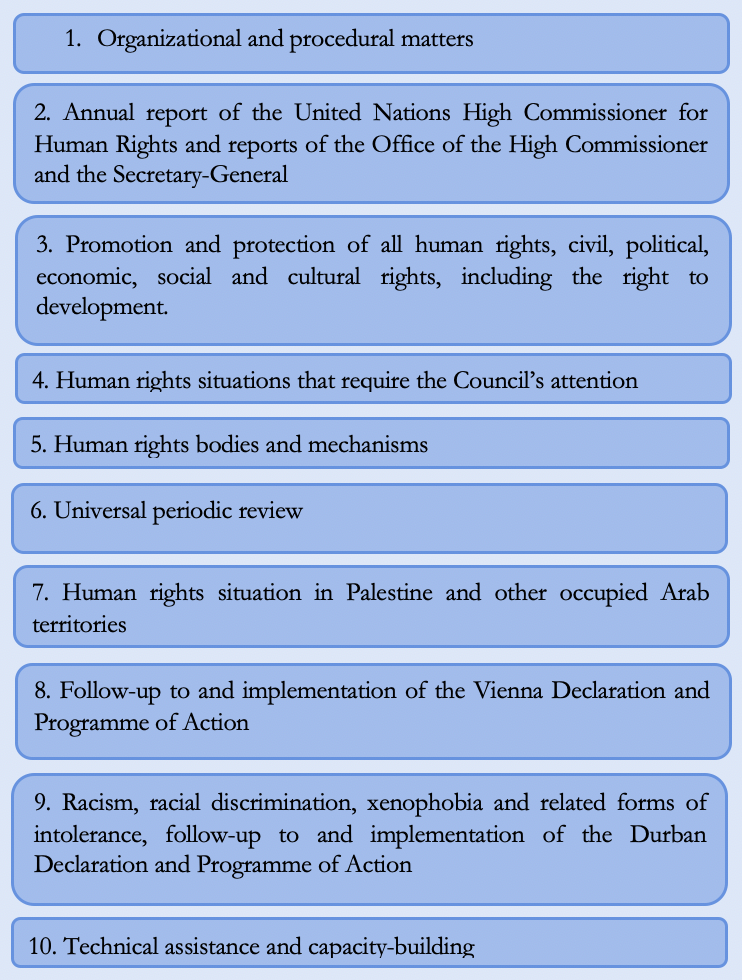
2. Opening Session and High Commissioner Annual Report
2.1 Elisabeth Tichy-Fisslberger
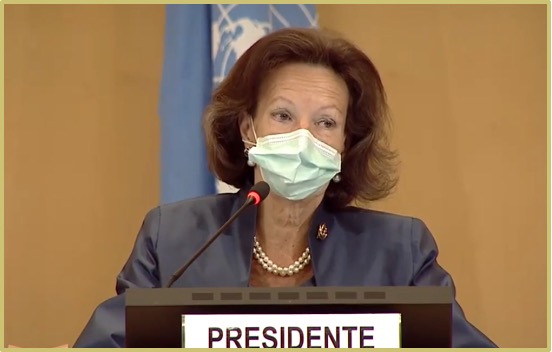 The 44th Session of the Human Rights Council was opened by President Elisabeth Tichy-Fisslberger in the morning of 30th July. As usual, the session started with “housekeeping” remarks by the President, although this time around those remarks were more extensive due to the newly implemented Covid-19 regulations. Tichy-Fisslberger elaborated on the changes in the code of conduct and procedural matters due to the COVID-19 pandemic. Furthermore, she explained that some country specific issues were postponed to the 45th Session.
The 44th Session of the Human Rights Council was opened by President Elisabeth Tichy-Fisslberger in the morning of 30th July. As usual, the session started with “housekeeping” remarks by the President, although this time around those remarks were more extensive due to the newly implemented Covid-19 regulations. Tichy-Fisslberger elaborated on the changes in the code of conduct and procedural matters due to the COVID-19 pandemic. Furthermore, she explained that some country specific issues were postponed to the 45th Session.
The President further stated that the 44th Session would not have any official side-events held at the Palais de Nations and external side-events will not appear on the official schedule of the 44th Session. Tichy-Fisslberger advised that the new set of rules and procedures will only apply to HRC sessions during the COVID-19 pandemic and in due course, the Council will eventually revert to its usual workflow.
The President firmly cautioned that no forms of sexual harassment will be tolerated and affirmed that the Palais and everything surrounding the Council were safe spaces in which all allegations will be investigated, including allegations of intimidation towards members of the civil society.
The President finished her opening remarks by welcoming the High Commissioner for Human Rights, Michelle Bachelet, to the 44th HRC session.
2.2 Michelle Bachelet
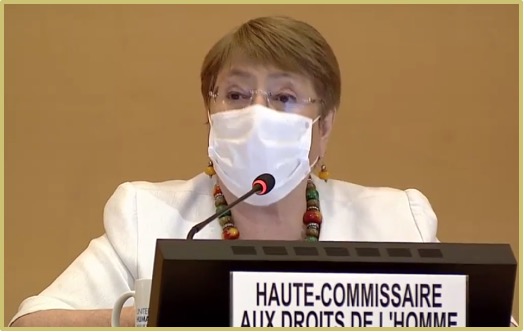 The High Commissioner, Michelle Bachelet, commenced her address by highlighting the connections between Human Rights and the COVID-19 pandemic. She reiterated that strong and united leadership is necessary to battle COVID-19 on a national and international level. She emphasized that this kind of leadership must be grounded in clarity, evidence, and principle. She reverberated that governments and leaders must not use the COVID-19 to violate human rights, particularly freedom of speech and expression, and condemned the crackdowns on civil society members under the false pretence of battling the virus.
The High Commissioner, Michelle Bachelet, commenced her address by highlighting the connections between Human Rights and the COVID-19 pandemic. She reiterated that strong and united leadership is necessary to battle COVID-19 on a national and international level. She emphasized that this kind of leadership must be grounded in clarity, evidence, and principle. She reverberated that governments and leaders must not use the COVID-19 to violate human rights, particularly freedom of speech and expression, and condemned the crackdowns on civil society members under the false pretence of battling the virus.
The High Commissioner mentioned several societal groups that are heavily influenced by the pandemic such as people of colour, people of African descent, women and children. She compared the pandemic with a heatseeking device that exposes and worsens already existing human rights violations across the globe. Those existing violations and miseries around the world are bound to get worse during and after the pandemic. The High Commissioner highlights that millions of children across the globe will experience extreme poverty and hunger if the international community does not step up their efforts to protect them. She called for the full attention of the international community towards battling the virus and joined the UN Secretary-General, Antonio Guterres, in his call for a global ceasefire.
The High Commissioner further discusses country and topic specific issues that this report will subsequently elaborate on. She concluded her statement by calling upon the international community to uphold human rights during the pandemic.
2.3 Carrie Lam
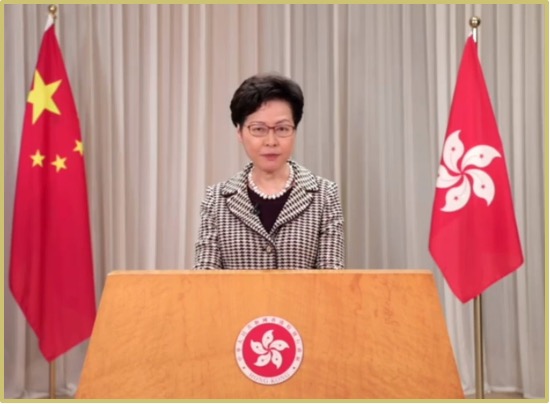 Concluding the opening of the 44th HRC Session, Carrie Lam, delivered a statement via pre-recorded video. Lam, the Chief Executive of Hong Kong, elaborated on the situation in Hong Kong.
Concluding the opening of the 44th HRC Session, Carrie Lam, delivered a statement via pre-recorded video. Lam, the Chief Executive of Hong Kong, elaborated on the situation in Hong Kong.
She explains that maintaining national security is the main aspect of statehood and that legislation is needed to ensure the national security of Hong Kong and China. She emphasised the need and “constitutional duty” to reunify China.
She concluded her statement by reiterating that China’s reunification is non-negotiable and that foreign countries have no authority to judge affairs of mainland China and Hong Kong and should instead focus on their own national security agenda.
3. GICJ Participation at the 44th Session of the HRC
3.1 Oral Statements
Item 2 - ID with the High Commissioner on the human rights situation of Rohingya people
Summary
On the 30th June, the Interactive Dialogue with the High Commissioner on the Human Rights situation of the Rohingya people took place. The High Commissioner reiterates in her oral update that the situation for the Rohingya refugees and the remaining Rohingya in Rakhine State has not improved. She confirmed the absence of the necessary conditions for their safe return and livelihood. She states that there is an ongoing armed conflict in Myanmar and mechanisms of discrimination and exclusion are still employed by the Myanmar government. The government still issues National Verification Cards that render the Rohingya people stateless and strip them of their basic human rights. She urged Myanmar to grant the Rohingya people citizenship before the general elections this year, so that they are eligible to take part in the voting process.
The High Commissioner further discussed the serious human rights violations committed by the Myanmar government such as air strikes, the burning of civilian areas and townships. Those violations are well documented through satellite images and serve as evidence for atrocities that have occurred since 2017. She called on the Myanmar government to preserve all evidence of the atrocities to hold perpetrators accountable. The High Commissioner expressed doubt on the credibility of the investigative process carried out by the Myanmar government and indicated support for the ICC prosecution process.
In response to the oral update and report, the Myanmar government delivered an oral statement stating that the government is working relentlessly to resolve the situation. The representative mentions that the Rakhine State is only one of the many challenges that Myanmar faces but it will receive special attention. The representative further stated that the process is hindered by the ongoing terrorist threats in Myanmar.
Joint Oral Statement with International-Lawyers.Org
Delivered by Mr. Augustine Sokimi
Thank You.
International-Lawyers.Org and Geneva International Centre for Justice welcome the oral update of the High Commissioner and encourages her to intensify the pursuit of accountability for gross violations of human rights. The impunity which states enjoy is an abhorrent reality that must be put to an end. The unspeakable violations by states must be laid bare, there can be no denial or suppression of the violations as that is an insult to all its victims and survivors.
At this 44th session, we urge Myanmar to end its violations in the Rakhine State, to ensure the human rights of Rohingya Muslims, and to undergo a process of deep reflection and reform towards a state built on fundamental democratic principles for all its peoples, including the Rohingya Muslims.
The violence must stop, and investigations into violations must be pursued relentlessly, and transparently, with integrity and credibility. Perpetrators must be held to account, state organs and structures facilitating systematic violations must be dismantled, and the human rights of Rohingya Muslims must be guaranteed through their empowerment to equal citizenry.
This requires true political will and as a first step, Myanmar must comply with the provisional measures ordered by the International Court of Justice and cooperate with the High Commissioner, UN special procedures, and this Council.
Thank You.
Item 3 - ID with the Special Rapporteur on Extrajudicial, Summary or Arbitrary Executions
Summary
On 9th July, the Human Rights Council held an interactive dialogue with the Special Rapporteur on extrajudicial, summary or arbitrary executions, Ms. Agnes Callamard.
The Special Rapporteur presented her report which focused on the use of force through armed drone technology. She stated that the mere existence of armed drones does not justify their indiscriminate deployment. She further raised concern at the absence of standards governing drones’ development, proliferation, export, or capability for use of force. The Special Rapporteur also highlighted the right to life in the context of the COVID-19 pandemic and discussed the policing of peaceful assemblies, such as the Black Lives Matter movement in the United States and the ongoing demonstrations in Hong Kong. She called for the implementation of strong measures to eliminate the disproportionate use of force and to eradicate racial profiling and discrimination.
The following States participated in the interactive dialogue: European Union, Iceland on behalf of Nordic countries, Iran, Liechtenstein, Cuba, State of Palestine, Libya, Afghanistan, Venezuela, France, Pakistan, India, Australia, Syria, Panama, Iraq, Nigeria, United Kingdom, Netherlands, South Sudan, Turkey, Uruguay, Switzerland and China.
International-Lawyers.Org and Geneva International Centre for Justice delivered a joint statement at the interactive dialogue which urged the international community to openly engage in a public discussion about the ethics, legality, and effectiveness of what the Special Rapporteur describes as the “decapitation” strategy at the heart of drones targeted killings, and about the measures of their success, in terms of a long-term vision for the sustainable protection of human lives and global peace. The joint statement recognised that the use of armed drones by a vast array of State and non-State actors had increased since 2015. It further drew attention to the use of drones by the Iraqi and Houthi militias as well as ISIS. International-Lawyer.Org and GICJ supported the Special Rapporteur’s call for international scrutiny and oversight over the use of drones, particularly when they are used in targeted killings resulting in an arbitrary deprivation of life. We further called on UN Member States to respond publicly to cases of pre-emptive self-defence, including those where drones are used, which violate international law.
Joint Oral statement with International-Lawyers.Org
Delivered by Mr. Dave Inder Comar
President of the Council,
Distinguished members,
We would like to thank the Special Rapporteur on extrajudicial, summary or arbitrary executions, for her report, and we urge the international community to openly engage in a public discussion about the ethics, legality, and effectiveness of what the Special Rapporteur describes as the “decapitation” strategy at the heart of drones targeted killings, and about the measures of their success, in terms of a long-term vision for the sustainable protection of human lives and global peace.
As the report discusses, the use of armed drones by a vast array of State and non-State actors, were increased since 2015. Drones are widely used, including for the purpose of use of force, such as targeted killings. Besides the many states, we are witnessing the use of drones by the Iraqi and Houthi militias as well as ISIS.
International-Lawyers Org and Geneva International Centre for Justice support the Special Rapporteur’s call for international scrutiny and oversight over the use of drones, particularly when they are used in targeted killings resulting in an arbitrary deprivation of life.
We also call on UN Member States to respond publicly to cases of pre-emptive self-defense, including those where drones are used, which violate international law.
We urge the UN, and all its independent members states to do all its efforts to enforce international law with respect the use of drones by both state and non-state actors, including militias, and to work to restore the rule of law and compliance with fundamental human rights.
Thank You.
Item 3 - ID with the Special Rapporteur on the Human Rights of Internally Displaced Persons.
Summary
The Special Rapporteur on the human rights of internally displaced persons, Cecilia Jimenez-Damary, delivered two separate reports, A/HRC/44/41, and A/HRC/44/41/Add.1, at the 44th session of the Human Rights Council. The former report discusses persons with disabilities in the context of internal displacement; the latter presents an overview of the situation of internally displaced persons (IDPs) in Iraq.
Regarding her first report, she encourages States and other actors to shift from awareness of disabilities to a proactive human rights-based disability inclusion strategy. IDPs with disabilities should enjoy the same equal rights of participation in decision-making processes.
The Special Rapporteur highlighted the main difficulties and obstacles facing the internally displaced in Iraq, such as the lack of documentation, discrimination (especially minorities), and collective criminal responsibility. The Special Rapporteur calls on the Government of Iraq to ensure that returns are safe, voluntary, informed, and dignified. As the country concerned, Iraq responded that the Government is taking enough measures to protect and support the IDPs in Iraq. Much of what has been said by the delegation of Iraq does not reflect reality or what the Special Rapporteur had highlighted.
Several countries and groups supported the strategy of a proactive human rights-based disability inclusion strategy.
The African Group were united in their statements, mostly mentioning terrorism as a root cause of displacement. Therefore, African countries also paid attention to the Kampala Convention for the protection and assistance of Internally Displaced Persons in Africa. This reflects a good collaboration at a regional level.
Joint Oral Statement with EAFORD
Delivered by Mr. Mathieu J. Fournier
Thank you, Madam President,
We welcomes the report of the Special Rapporteur on the Human Rights of Internally displaced persons for her report and for the report about her visit to Iraq, in which she addresses important issue related to the continued plight of IDPs in Iraq.
As the Special Rapporteur mentioned in her report, many IDP fled conflicts zones due to the Government’s own operations against ISIL. Armed groups, namely the militias have committed heinous violations against IDPs, including killings and abductions, and until nowadays they are preventing many of them from returning to their homes
Unfortunately, the Iraqi Government is based on a sectarian system which is reliant on the militias. Such a system is ill-suited to resolve any issue, including of person displaced on sectarian basis. We note, however, that this discussion is absent from the report and other UN reports.
It must be understood that without profound change of the sectarian system, the Iraqi Government will not have the capacity of resolving this complex issue, nor will it have the political will to do so.
EAFORD and Geneva International Centre for Justice therefore calls on this Council to recognize the dilemma and increase its focus on the human rights situation in Iraq, including those IDPs who have disappeared after being abducted, and those who are prevented to return by the militias.
Thank You.
Item 3 - ID with the Special Representative of the Secretary-General on violence against children
Summary
The Special Representative of the Secretary General for violence against children (SRSG), Ms. Maalla M’jid, submitted her report on the increased risk of violence to children around the world due to the COVID-19 pandemic and urged member states to ensure that essential child protective services remain accessible to all children during the crisis. She also commented on the recent report published by her office, which focused on the impact of violence on the mental health of children. She encouraged member states to prioritize access to mental health services and other forms of rehabilitation in communities, healthcare structures, and in humanitarian situations. The Special Representative was joined in calling for the elimination of stigmas on mental health by member states, including representatives from the Arab Group, the Nordic and Baltic states, a group of Latin American countries, and the European Union. The remarks by individual countries mainly focused on the potential impact of the COVID-19 pandemic on violence against children, echoing the concerns shared by the Special Representative that violence, abuse, and neglect will increase during the ongoing crisis. Delegates also drew attention to the issue of violence towards children on digital platforms and urged both the Special Representative and member states to consider how violent extremism, racism, discrimination, and climate change will impact violence against children.
In a joint statement with EAFORD, Geneva International Centre for Justice, said that children impacted by violence suffer lifelong consequences. The experience of violence impacts children’s social, emotional and physical development and well-being.
Violence against children poses a great concern and obstacle for meeting the 2030 Sustainable Development goals. Children all around the globe in different social, cultural and environmental settings are exposed to many forms of direct and indirect violence.
The two organizations call on the international community to:
- help to eliminate all forms of violence and children, direct and indirect;
- continue working on implementation of Sustainable Development Goal 16.
Joint Oral Statement with EAFORD
Delivered by Ms. Eva Kehoe
Thank you.
We thank the Special Representative of the Secretary General on the update on the current situation concerning violence against children and the results achieved on national and international level. Children impacted by violence suffer lifelong consequences. The experience of violence impacts children’s social, emotional and physical development and well-being.
Violence against children poses a great concern and obstacle for meeting the 2030 Sustainable Development goals. Children all around the globe in different social, cultural and environmental settings are exposed to many forms of direct and indirect violence.
Maternal maltreatment and childhood exposure to violence present an important predictive in violent tendencies towards children. Moreover, children may also experience harm when their caregivers are subjected violence by their intimate partners. Yet, the Covid-19 pandemic, the combination of economic and social stresses, the lockdowns have been followed by a global surge in domestic violence directed towards women - almost in all countries. This has extremely negative consequences on mental health of children experiencing such situations. Thus, we wish to ask the Special Representative what are current trends concerning violence against children during the Covid-19 pandemic?
In conclusion, EAFORD and Geneva International Centre for Justice call on the international community to:
- Help to eliminate all forms of violence and children, direct and indirect.
- To continue working on implementation of Sustainable Development Goal 16.
Thank You.
Item 3 - ID with the Special Representative of the Secretary-General for Children and Armed Conflict
Summary
The Special Representative of the Secretary General for children and armed conflict (SRSG), Ms. Virginia Gamba, submitted her annual report on the grave risks facing children, who were the primary victims of armed conflict in 2019. She specifically addressed two issues that are worsening: rape and other forms of sexual violence against conflict-affected children, and attacks against schools and hospitals. These are egregious crimes that greatly affect the mental well-being and development of children across the globe. The Special Representative also commented on the large number of children detained in the past year for alleged association with armed groups or other national security threats, and urged States to treat these children as victims first and foremost instead of violating their liberty through detention. Finally, she pressed States to ratify the Optional Protocol to the Convention on the Rights of the Child on the involvement of children in armed conflict if they have not already done so, a message she was joined in by groups of countries including the European Union, the Africa Group, and groups from Latin America. Remarks from individual states echoed and reinforced the comments of the Special Representative, particularly on the importance of rehabilitation and reintegration programs for children involved in armed conflict.
Geneva International Centre for Justice appreciates the Special Representative’s commitment to the Optional Protocol and joins the calls of the Special Representative and Member States for universal ratification. The issues addressed by the Special Representative in her report, particularly those of sexual violence and attacks against schools and hospitals, threaten the mental health and well-being of children across the globe. GICJ urges the Special Representative to place greater emphasis on the mental health of children in her research and advocacy. Children who are victims of sexual violence or targeted attacks on non-military institutions are at great risk of mental health challenges. GICJ urges the Special Representative to use her position to further de-stigmatization through mental health awareness; healthcare is a human right, and mindfulness and treatment of mental health should be included as such.
Joint Oral statement with EAFORD
Delivered by Mutua Kobia
Thank you, Mr. President,
EAFORD and Geneva International Centre for Justice welcomes the report of the Special Representative of the Secretary General. The report identifies the progress made so far without minimizing the efforts that still need to be done.
Conflicts have an appalling impact on communities, and this is most notable against children who remain vulnerable and defenceless. Whether in Syria, the DRC, Myanmar, Iraq, or Yemen, the situation of children in conflict zones is most urgent. Any report stating difficulties of access to information cannot at the same time claim progress.
More alarming, the protection of children in armed conflict has been a subject discussed for decades. We cannot afford a “lessons learned” approach anymore. According to the Report of the Secretary-General, 24,422 violations were committed against children in 2019, about 7,747 were recruited in armed conflicts, and some 10,173 children have been killed or maimed. These are not numbers of an international community that has learned its lesson.
Now, non- actors are posing a significant obstacle to an international order based on state actors. We encourage all efforts to tackle this predicament. It is not sufficient to only rely on, and discuss with, states and regional security mechanisms. The international community needs new, bold, and innovative strategies. Such strategies were needed yesterday.
On the other hand, we remain confused as to the Secretary General’s decision to remove from its shame list some of the violators. Nothing justified such a move and we now fear a trend towards neglect of the issue.
Thank you.
Item 3 - ID with the Special Rapporteur on trafficking of persons, especially women and children
Joint Oral statement with EAFORD
Delivered by Mr. Mutua K. Kobia
Thank you, Mr. President,
We thank the Special Rapporteur for her report on “Trafficking in persons, especially women and children” and note the mention of forced labour in the context of trafficking as a massive widespread phenomenon.
We also recognize that racism and xenophobia further exacerbate the plight of persons in trafficking and creates additional vulnerabilities especially in armed conflict situations. In light of this, EAFORD and Geneva International Centre for Justice would like to draw the attention of the Special Rapporteur to the specific situation of trafficking in regions and areas of conflict where women, children, and men of specific ethnic groups are trafficked for sexual exploitation, sexual gifts, child soldiers, removal of organs, forced labour and forced marriage. Often, the purposes are either to further exacerbate conflict by drawing in capital and by using the trafficked persons in labour or to serve the perpetrators.
In the report, concerns are raised on the issue of how conflict fuels trafficking in persons, however, it is also important to note the impact of various forms of discrimination and xenophobia in this situation.
We would like to ask the special rapporteur if there are any significant trends or links regarding various forms of discrimination and xenophobia in conflict situations where trafficking of persons occurs?
In conclusion, our organisations maintain that trafficking is a multi-faceted issue and trafficking prevention must begin with proper research into local conditions. Furthermore, States should review laws and administrative practices to eliminate discriminatory bias that adds barriers for trafficking victims who are women or racial minorities.
Thank you.
Item 3 - ID with Special Rapporteur on the Promotion and Protection of the Right to Freedom of Opinion and Expression Meeting
Summary
The Item 3 interactive dialogue with Special Rapporteur on the promotion and protection of the right to freedom of opinion and expression, held on July 6, 2020, began with the Special Rapporteur’s address. In his statement, David Kaye listed five challenges that he would like States to take on in order to improve individuals’ right to freely express their opinion, especially during the COVID-19 pandemic.
The four key issues, emphasized by States and groups of States that participated in the interactive dialogue, were the importance of protecting the rights of journalists and media, the necessity of governments having an open dialogue with the public in order to spread information regarding the COVID-19 pandemic, the fact that freedom of expression and opinion are interrelated and interdependent with democracy, and that governments must prevent and urgently respond to disinformation.
First, the Special Rapporteur asserted that it is essential that governments share as much information as possible in order to protect their people from COVID-19. Second, he argued that governments must stop shutting down the internet in their States and should make it is a priority to bring internet access to all individuals in their States. Third, the Special Rapporteur stated that governments must refrain from attacking the media and journalists during and after the Coronavirus pandemic so that information can freely spread. Fourth, he avowed that it is best if governments do not sanction those who spread disinformation so that people who have helpful information feel comfortable sharing their facts without fear of punishment. Finally, the Special Rapporteur emphasized the need for States to implement public health surveillance in order to properly track and prevent the spread of the Coronavirus. He made it clear though that this must be done in accordance with human rights law norms and must be non-discriminatory.
After the Special Rapporteur spoke, several States discussed the importance of protecting the right to freedom of opinion and expression. The European Union expressed its deep concern regarding the increased restriction of information and the spread of unreliable information.
The EU asserted that when States restrict information, they prevent individuals from learning about the Coronavirus. This can cause the virus to spread quicker and to become more prevalent. The same goes for unreliable information.
Burkina Faso spoke on behalf of the African Group. The African Group asserted its concern with hate speech and discrimination, especially during the COVID-19 pandemic. This is because hate speech and discrimination violate human rights. Thus, although individuals should have the right to express themselves, they should not manipulate this right to make racist statements.
Following the African Group, Sweden delivered a statement on behalf of the Nordic and Baltic Countries. This group of countries called on States to protect journalists and the media from threats and harm. This is because these entities are essential for the spread of accurate information that individuals can learn from to help prevent the spread of COVID-19.
Costa Rica spoke on behalf of a Group of Countries. This Group avowed that States should have a dynamic relationship of trust with their people to make sure individuals get accurate developments about the current pandemic urgently. This Group also expressed that managing disinformation is essential for the wellbeing of the general public.
Lebanon suggested that States should hold campaigns of awareness to prevent the spread of fake news. Campaigns can help effectively inform the public because they typically involve social media, billboards, posters, and other forms of advertisements. This recommendation is important because it allows people of all age demographics to easily access helpful information regarding the pandemic. Lebanon also highlighted the importance of medical authorities making sure that they are transparent in providing health information.
The Special Rapporteur then gave the closing remarks. The Special Rapporteur repeated the threats to freedom of expression that must be promptly addressed by governments. He avowed that officials’ harming of journalists, censorship of media, and attacks on artists and academics are plaguing individuals’ natural rights. The Special Rapporteur then urged States to be responsible to ensure the well-being of their people and to lift restrictions on freedoms of individuals that are needed during this pandemic after the pandemic is over.
Item 9 - ID with the Special Rapporteur on Racism
Summary
An interactive dialogue was held under Item 9 to discuss reports submitted by Ms. E. Tendayi Achiume, the Special Rapporteur on contemporary forms of racism, racial discrimination, xenophobia, and related intolerance.
Her first report, “Racial discrimination and emerging digital technologies: a human rights analysis” (A/HRC/44/57), emphasized that new emerging digital technology reproduces all existing inequalities within the society it is designed and used in as racial and ethnic minorities are rarely involved in the decision-making roles. The Special Rapporteur encouraged States to act immediately by ensuring minorities and racial discrimination experts have a seat at the table. Not only does accountability need to take place, but impact assessments, effective remedies, and minority inclusion need to be obligations for all States and companies involved in emerging digital technologies. Many countries emphasized powerful conclusions from the Special Rapporteur’s report by agreeing that technology is not neutral or objective and insisting that transparency and regulation are essential to begin fighting discrimination in the design and use of technology. States believed that privacy, dignity, and integrity should be upheld and respected for everyone and that digital transformation should benefit all people.
The Special Rapporteur also submitted a report on “Combating glorification of Nazism, neo-Nazism and other practices that contribute to fueling contemporary forms of racism, racial discrimination, xenophobia and related intolerance” (A/HRC/44/58). She emphasized that a new surge of anti-Semitism, hate speech used by politicians, and the glorification of Nazism is occurring in many nations. With today’s normalization of hate speech and discriminatory behavior, States agreed that they must eradicate the spread of neo-Nazism by condemning racial discrimination and racism in all its forms. Many advocated that in order to deplete racism, education is the key to raising awareness, promoting dialogue, and changing discriminatory behaviour.
Joint Oral statement with EAFORD
Delivered by Ms. Daniela Donges
Thank you, President,
We commend the Special Rapporteur’s report on racial discrimination and digital technologies, emphasizing that racial discrimination is embedded in emerging digital technologies such as artificial intelligence. We agree that technology produces racial inequalities and that urgent action is needed to include minorities, assess human rights impacts, and provide effective remedies.
EAFORD and Geneva4Justice call on all member states to make efforts in order for the Digital platforms and big data, to be used to expose inequalities and serve as a platform to contribute to an end of racial divisions.
Regarding the report on Nazism and neo-Nazism, we share the concern about the rise of antisemitism, and agree that more concrete steps need to be taken in addition to the existing international human rights laws. We stress the Special Rapporteur’s point that education is vital to address racism.
To this end, we would like to ask the Special Rapporteur: If the DDPA is comprehensive in eliminating the evils of racism, why has the DDPA and programme of Action still not been implemented by all states? And, what is currently being done to ensure effective commemoration of its 20 Year Anniversary?
To conclude, we urge all member states to:
- Assume responsibility and stay committed to combatting all forms of racism.
- Collect, analyse, and make available reliable data on racial discrimination.
- Lastly, we strongly recommend states to support, adopt and fully implement the Durban Declaration and Programme of Action.
Thank you.
Item 9 - ID with the Special Rapporteur on the situation of human rights in the Palestinian Territory occupied since 1967
Summary
On 16th July, an interactive dialogue was held with Mr. S. Michael Lynk, the Special Rapporteur on the situation of human rights in the Palestinian Territory occupied since 1967.
The Special Rapporteur presented his most recent report (A/HRC/44/60) which focused on Israel’s continued use of collective punishment as a prominent instrument in its coercive toolbox for population control in the occupied Palestinian territories, despite numerous reports and reminders critical of its use. Israel, as a country concerned, did not take the floor to address the report of the Special Rapporteur. The State of Palestine, as a country concerned, expressed disappointment with the international community for failing to take action against violations in the occupied territories since 1967. It condemned the United States “peace to prosperity” plan and called the international community to reject Israel’s annexation plans. Palestine highlighted that the 13-year long Gaza closure is among the worst forms of collective punishment and listed other forms of collective punishment implemented by Israel, including the demolition of Palestinian homes, and pillaging of Palestinian tax and monies.
The Arab Group, Organisation of Islamic Countries, African Group, Non-Aligned Movement, and European Union issued statements which called for Israel to cease its use of collective punishment and to put an end to the illegal occupation since 1967. All States which issued statements condemned Israel’s activities in the occupied territories. The States that issued statements were Tunisia, Malaysia, Qatar, Djibouti, Democratic People’s Republic of Korea, Libya, China, Afghanistan, Saudi Arabia, Russian Federation, Pakistan, Senegal, Venezuela, Cuba, Kuwait, Namibia, Iran, Chile, Mauritania, Bangladesh, Jordan, Indonesia, Botswana, South Africa, Morocco, Bahrain, Iraq, Lebanon, Oman, Turkey, Sudan, Egypt, Maldives, Sri Lanka, Yemen, United Arab Emirates, Algeria, Niger, Nicaragua, Spain, and Syrian Arab Republic.
Some of the key issues touched on by States were the condemnation of Israel’s use of collective punishment, the illegal Gaza embargo and blockade, the demolition of Palestinian homes causing displacement, the illegal expansion of Israeli settlements, the illegal annexation plans for the West Bank, the persistent violation of Palestinians’ human rights, and the need to put an end to the illegal occupation since 1967. Several States called for constructive efforts towards the two-state solution based on pre-1967 borders and expressed their solidarity with the Palestinian people and their right to self-determination. Several States expressed their support for the Special Rapporteur and commitment to the continuation of the agenda Item 7 focused on the occupied territories. Several states welcomed the High Commissioner’s database of business enterprises operating in the occupied Palestinian territories and called for its annual update.
Geneva International Centre for Justice extends its continued support to the Special Rapporteur and encourages him to continue his diligence and commitment towards fulfilling his mandate. We further call on the international community to take appropriate action against Israel should they proceed with their plans to illegally annex parts of the West Bank. GICJ remains steadfast in the pursuit of justice for Palestinians, towards guaranteeing their right to self-determination by putting an end to the illegal occupation since 1967, liberating them from suppression.
3.2 Written Statements
Human rights and the impact of COVID-19 on Rohingya refugees
Upholding human rights appears to become secondary to some governments in times of crisis. Thus, the already poor and neglected in society experience worse effects in critical times as they are further pushed aside. This situation is affecting Rohingya refugees right now, leaving devastating impacts as they are pushed further away from receiving any help or attention in these dire times.
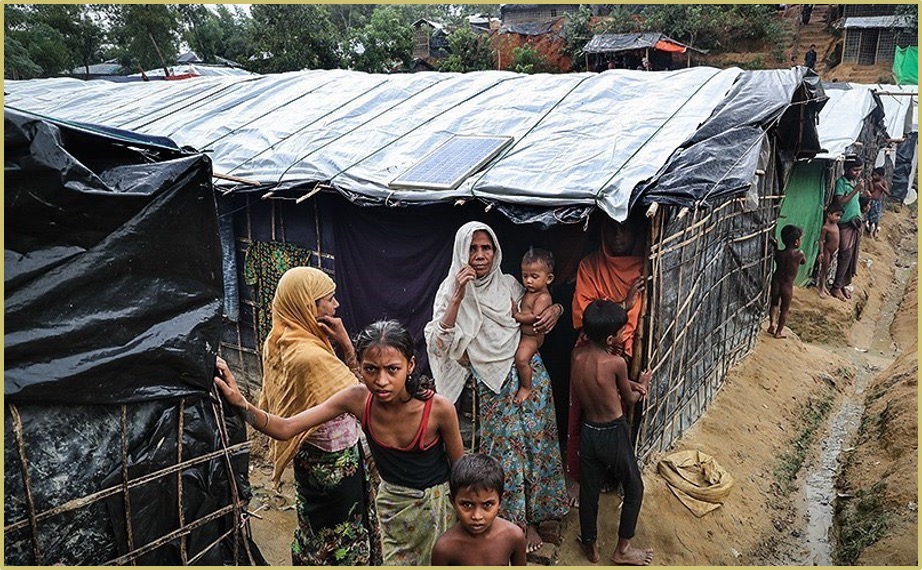
Starting in 2019, the Myanmar authorities “punished” residents of the Rakhine State with internet shutdowns. Those shutdowns stand in direct opposition to Article 19 of the Universal Declaration of Human Rights, which protects freedom of expression and grants the right to “receive and impart information and ideas through any media and regardless of frontiers.” The scope of internet shutdowns became worsened during COVID-19. Information on proper hygiene and social distancing measures is essential for saving lives during the pandemic and shutdowns deny citizens the information they need to protect themselves.
We further remind the international community that COVID-19 is not the only crisis that humanity faces today. There are individuals and groups that need special protection; thus, States must comply with existing international law despite the pandemic. The Government of Myanmar has proved over the past years that they are not interested in finding a peaceful solution and the authorities continued to develop new tools to oppress the Rohingya Muslim minority. The ICC decision to approve an investigation is a step in the right direction.
Link to full written statement
Justice for George Floyd and countless other black Americans whose stories are becoming much too familiar
The systematic injustices embedded in the American criminal justice system are being held under a microscope. People are growing tired of the countless injustices displayed against black communities. In the United States of America (USA), black people are faced with daily prejudices because of the colour of their skin. The injustices committed are becoming tragically normal. Structural racism is becoming an ever more apparent reality.
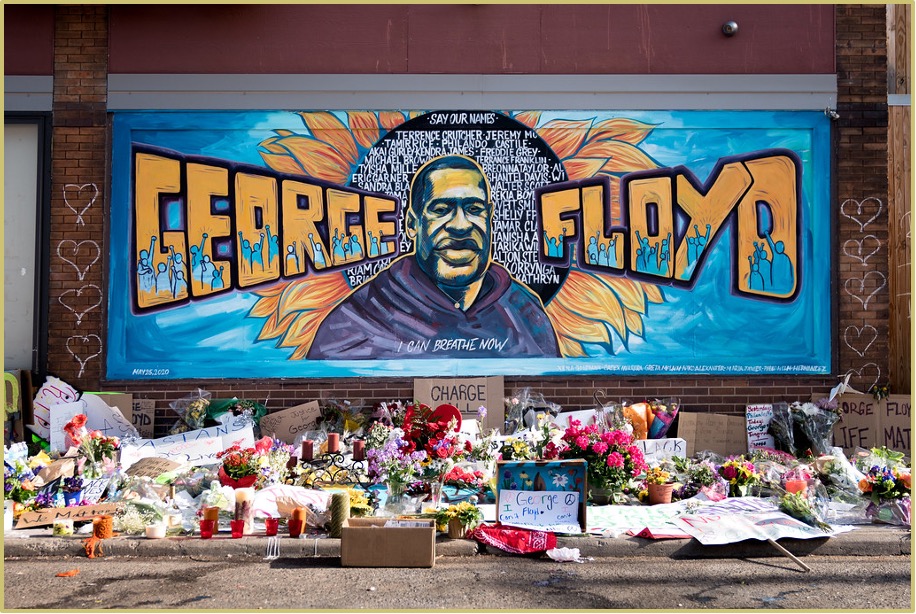
In a matter of days, the world has seen a black, handcuffed man pleading to breathe beneath the knee of a white police officer. This has resulted in omnipresent anger, peaceful as well as violent protests, and a demand that the officers involved face criminal charges. We demand justice for George Floyd, his family, and the lives of countless other black Americans who have been mistreated and violated by the current criminal justice system. We believe the institutional racism embedded into America’s criminal justice system can be changed, and this starts with perpetrators of all acts of police brutality being held accountable for their actions. We denounce the police officers involved in the death of George Floyd. The devaluation of human lives is unacceptable and must never be tolerated. We urge the international community to demand and insist on accountability.
Link to full written statement
War-created and conflict-mediated environmental pollution in Iraq
In the illegal invasion of Iraq referred to as the 2003 Iraq War, weapons of mass destruction were used on a large scale across the country. The killings, atrocities, and grave human rights abuses against innocent civilians have been widely reported. However, the impact it has had on the environment has often been overlooked. Contamination, pollution, tons of war debris and toxic waste has resulted in an environmental disaster leaving high levels of radiation, extensive PCB and sulphur contamination and several toxic stockpiles amongst others. To date, the polluters have yet to be held accountable and humanitarian responses and clean-up efforts are insufficient.
Furthermore, the explosions of bombs, release of ammunition, firing of bullets, and other such lethal activity during the war has polluted the environment and exposed millions of innocent and vulnerable civilians to neurotoxins and other such hazardous substances. This devastation continues to have serious environmental and subsequently public health crises.
We call upon the Special Rapporteur on human rights and the environment as well as the Special Rapporteur on the implications for human rights of the environmentally sound management and disposal of hazardous substances and wastes, to launch deeper investigations into war-created and conflict-mediated environmental pollution in accordance with their mandates and to report on the findings and conclusions. In addition, we implore that such an investigation be carried out in relation to the illegal invasion of Iraq and the illegal 2003 Iraq War. Such an investigation will greatly improve the humanitarian response efforts and reduce health-risks during clean-up efforts for workers as well as the overall population, including innocent children across Iraq.
Link to full written statement
Iraq: The ongoing plight of demonstrators
Despite the spread of the COVID-19 and subsequent lockdowns and curfews, demonstrations remain strong and the pandemic has not eliminated protesters’ demands. Thus, the Human Rights Council must remain vigilant. The new Iraqi government appointed on 7th May 2020, changed its rhetoric and promised ambitious policies, but has yet to put such words into action. Since the protests began in October 2019, they have been met with a violent and indiscriminate response. During her briefing to the Security Council on 3rd December 2019, the Special Representative of the Secretary-General in Iraq observed that the government’s response was unprovoked and targeted what was largely a peaceful protest.
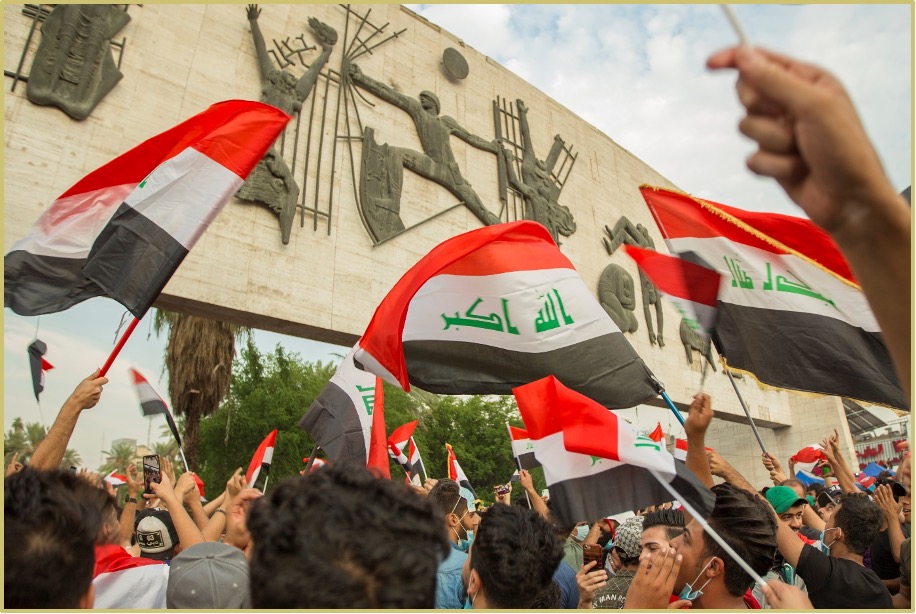
The protests have evolved into a call for a transition to a true democratic and sustainable political system, free from sectarian influences. The protesters are also demanding the end of the Iranian influence within the government and the armed forces. It is crucial for the international community to understand that what is needed and demanded by the protesters is not just a change of Prime Minister but a fundamental change of system, free from sectarian quota.
The international community must understand that the Iraqi judiciary is incapable of holding the government and the militias to account. We affirm that firm words by the Security Council and promises by the new Prime Minister will not achieve stability in Iraq unless all human rights violations are addressed in a comprehensive way and until a special international tribunal is established to bring to justice all perpetrators, especially those responsible for the killing, abduction and torture of peaceful demonstrators.
Link to full written statement
Environmental degradation, growing economic hardship, corruption and sectarianism continue to fuel Lebanon’s Protests
The Republic of Lebanon’s substantial environmental problem concerning pollution and environmental decline has made a startling reappearance in the midst of the COVID-19 public health emergency. The state of environmental degradation and rubbish crisis, which has been an ongoing issue, violates several human rights including the right to life and health. The unfortunate phenomena of sectarianism, corruption, and cronyism are central to this crisis. Management of waste continues to be a major “money-maker” and, consequently, much of the financial investment aimed at solving the problem is misappropriated by the local politicians and their associates. The COVID-19 heath emergency has made Lebanon’s controversial laissez-faire approach to rubbish disposal considerably more acute and life-threatening.
We are deeply concerned about the corruption, cronyism, and environmental degradation in Lebanon, and we urgently recommend to the Human Rights Council the following:
- Support the people’s call for an end to the sectarian power-sharing system and replace it with one based on democratic values.
- Investigate and punish individuals responsible for acts of corruption and ensure that stolen assets are recovered.
- Call on the government of Lebanon to establish a body of independent experts to monitor waste management systems.
- The government should ensure that waste management contracts are awarded to reputable companies without links to members of the government.
- The government should fully cooperate with international mechanisms and organizations that provide technical expertise to resolve the country’s political and environmental crisis.
Link to full written statement
The Annexation Planned by Israel Constitutes a Gross Violation of International Law
The Government of Israel threatens to annex the West Bank, which is part of the Occupied Palestinian Territory (OPT). The United States of America, a permanent member of the Security Council, has fully supported the annexation. This was confirmed by the so-called Trump Peace Plan, which seeks to legitimize Israel’s constant and ongoing systematic violations of international human rights and humanitarian laws in the OPT for generations. There are numerous reasons for Israel to abandon this destructive path. The obvious reason being that annexation by force is a flagrant violation of international law. The occupation of the West Bank has been a de facto annexation, prohibited by the Charter of the United Nations and the Fourth Geneva Convention of 1949.
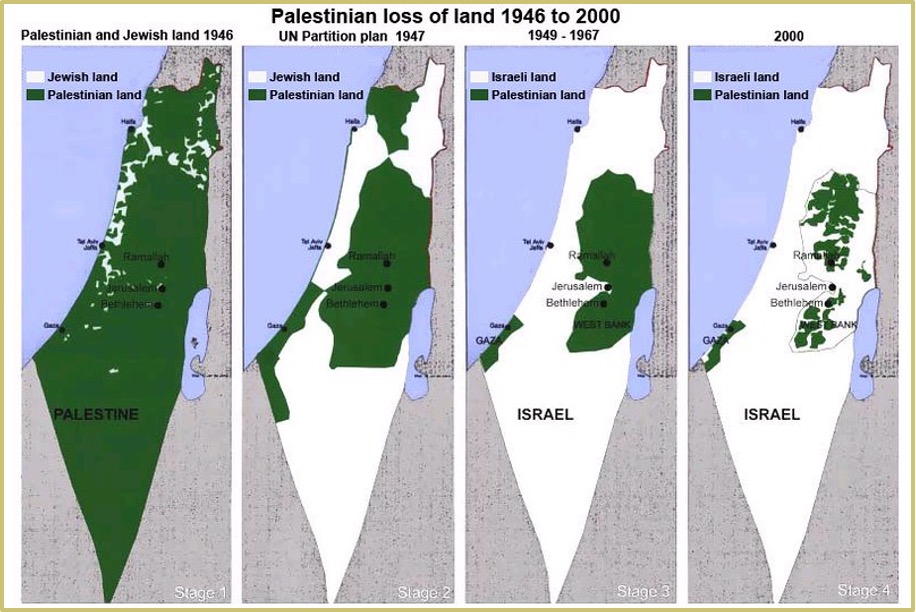
Currently, Israel is searching for ways to prolong its imposed authority over the OPT via a de jure annexation, which would put the occupied West Bank under Israeli law and relegate Palestinians to the highly populated areas. If pursued, these deplorable actions by Israel would further accelerate and intensify the ongoing human rights violations in the OPT, destroying any hope of restoring the right of Palestinians to self-determination. These as well as numerous other gross violations are well-known to the international community and have been captured by a voluminous mountain of documented evidence, including the work of UN special mandate holders and numerous accounts brought to light by human rights defenders.
It is important to note that Israel has annexed territory in the past despite international objections. Israel annexed East Jerusalem after seizing it, declaring the entire city as its united capital. In addition, Israel annexed the Golan Heights in 1981, which it had captured from the Syrian Arab Republic in the 1967 war. It is also important to recognize that the US administration has endorsed both of these prior annexations. Therefore, Israel’s threat to annex the West Bank must be taken seriously and requires urgent action to prevent its realization.
Link to full written statement
Read GICJ reports on the previous Sessions of the Human Rights Council:
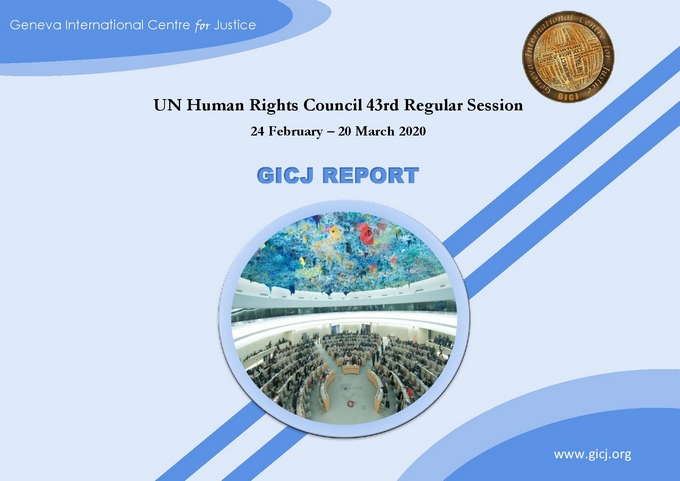 |
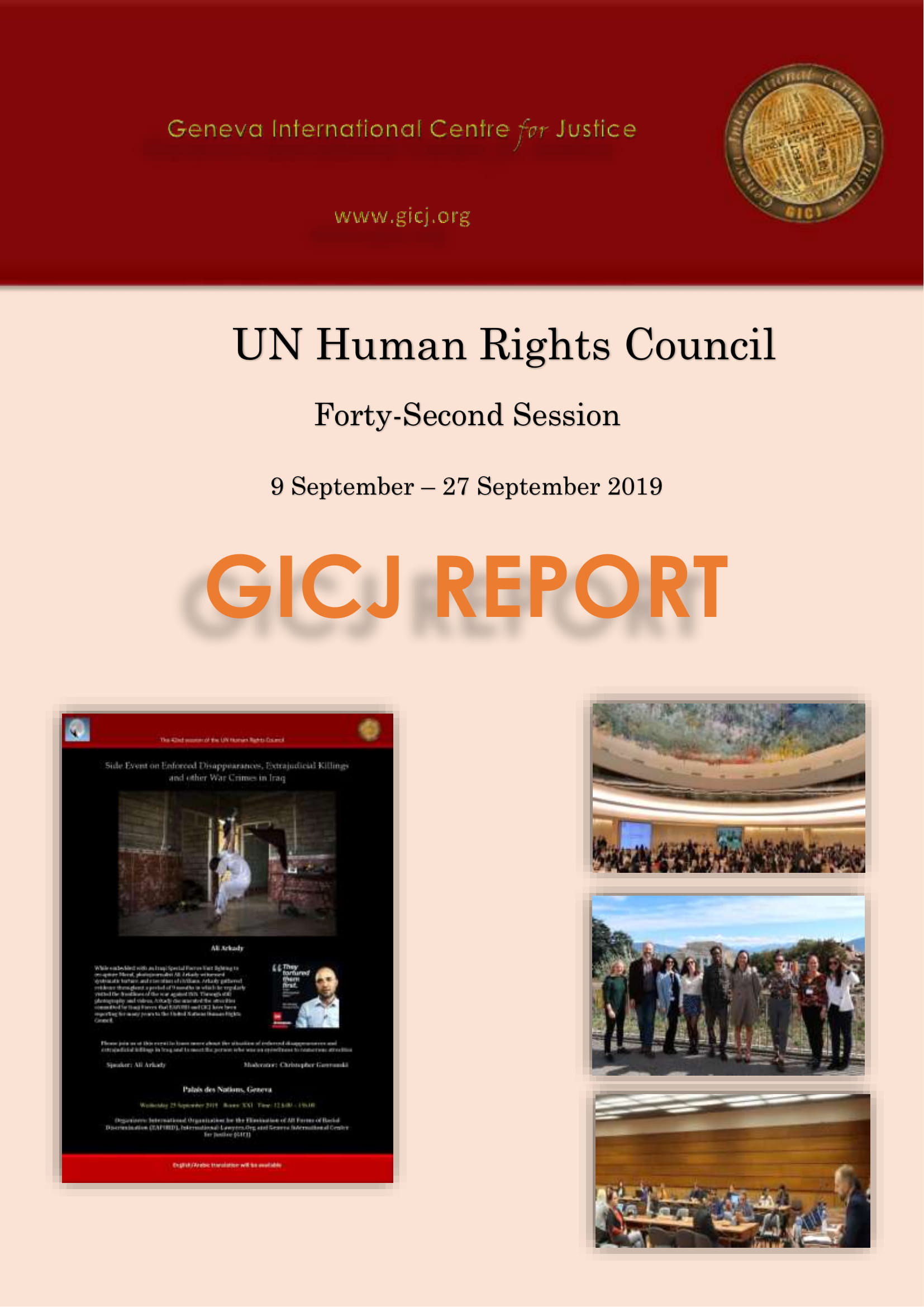 |
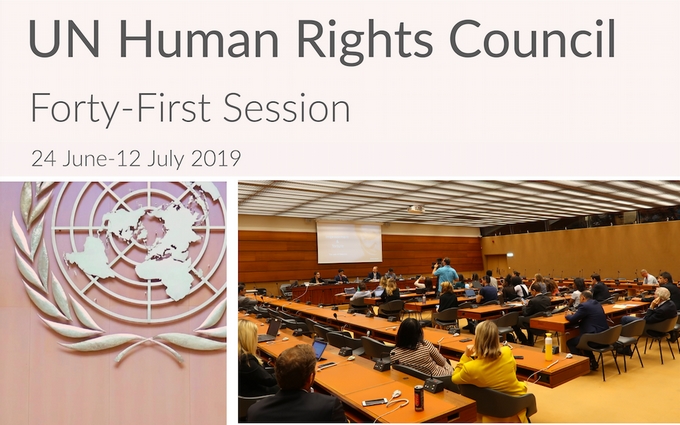 |
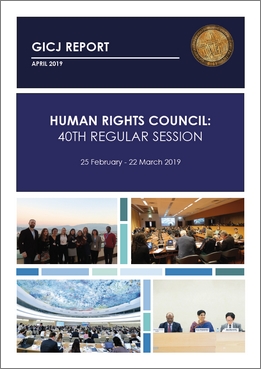 |




